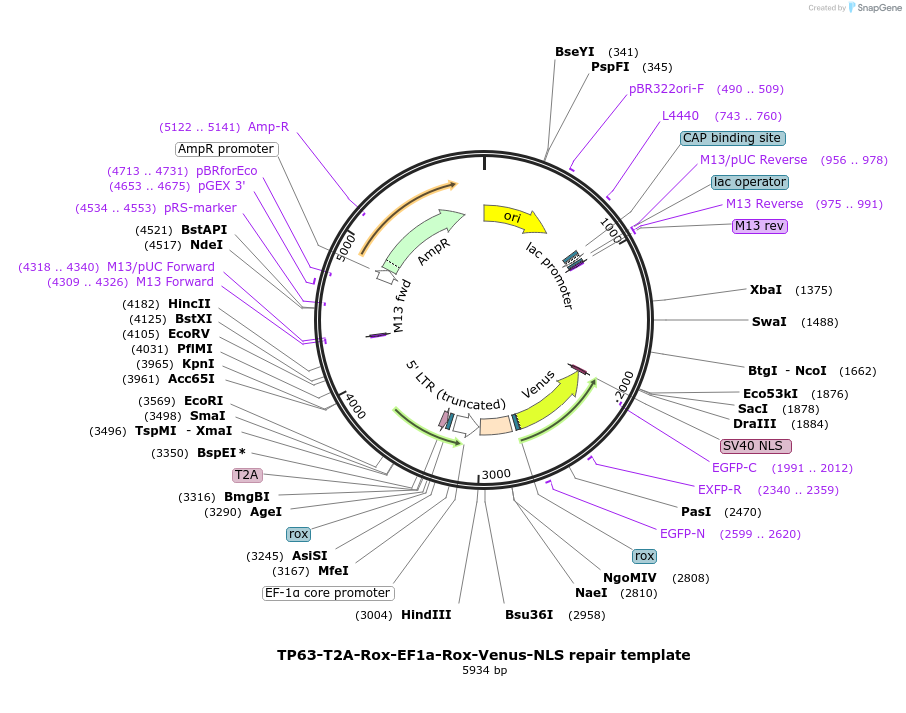TP63-T2A-Rox-EF1a-Rox-Venus-NLS repair template
(Plasmid
#167971)
-
PurposeTp63 reporter targeting repair template
-
Depositing Lab
-
Sequence Information
Ordering
| Item | Catalog # | Description | Quantity | Price (USD) | |
|---|---|---|---|---|---|
| Plasmid | 167971 | Standard format: Plasmid sent in bacteria as agar stab | 1 | $89 | |
Backbone
-
Vector backboneBluescript
-
Vector typeMammalian Expression, CRISPR ; Donor Template
Growth in Bacteria
-
Bacterial Resistance(s)Ampicillin, 100 μg/mL
-
Growth Temperature37°C
-
Growth Strain(s)DH5alpha
-
Copy numberUnknown
Gene/Insert
-
Gene/Insert nameTp63
-
SpeciesH. sapiens (human)
-
Mutationhomology arms contain point mutations to disrupt crRNA binding sites used and point mutations specific to WTC genome
-
Entrez GeneTP63 (a.k.a. AIS, B(p51A), B(p51B), EEC3, KET, LMS, NBP, OFC8, RHS, SHFM4, TP53CP, TP53L, TP73L, p40, p51, p53CP, p63, p73H, p73L)
-
Tag
/ Fusion Protein
- Venus (C terminal on insert)
Cloning Information
- Cloning method Gibson Cloning
- 5′ sequencing primer CAGGAAACAGCTATGAC
- 3′ sequencing primer TGTAAAACGACGGCCAGT
- (Common Sequencing Primers)
Terms and Licenses
-
Academic/Nonprofit Terms
-
Industry Terms
- Not Available to Industry
Trademarks:
- Zeocin® is an InvivoGen trademark.
Depositor Comments
Please visit https://www.biorxiv.org/content/10.1101/2020.05.04.076067v2 for bioRxiv preprint.
These plasmids were created by your colleagues. Please acknowledge the Principal Investigator, cite the article in which the plasmids were described, and include Addgene in the Materials and Methods of your future publications.
-
For your Materials & Methods section:
TP63-T2A-Rox-EF1a-Rox-Venus-NLS repair template was a gift from Emma Rawlins (Addgene plasmid # 167971 ; http://n2t.net/addgene:167971 ; RRID:Addgene_167971) -
For your References section:
A functional genetic toolbox for human tissue-derived organoids. Sun D, Evans L, Perrone F, Sokleva V, Lim K, Rezakhani S, Lutolf M, Zilbauer M, Rawlins EL. eLife. 2021 Oct 6;10. pii: 67886. doi: 10.7554/eLife.67886. 10.7554/eLife.67886 PubMed 34612202



